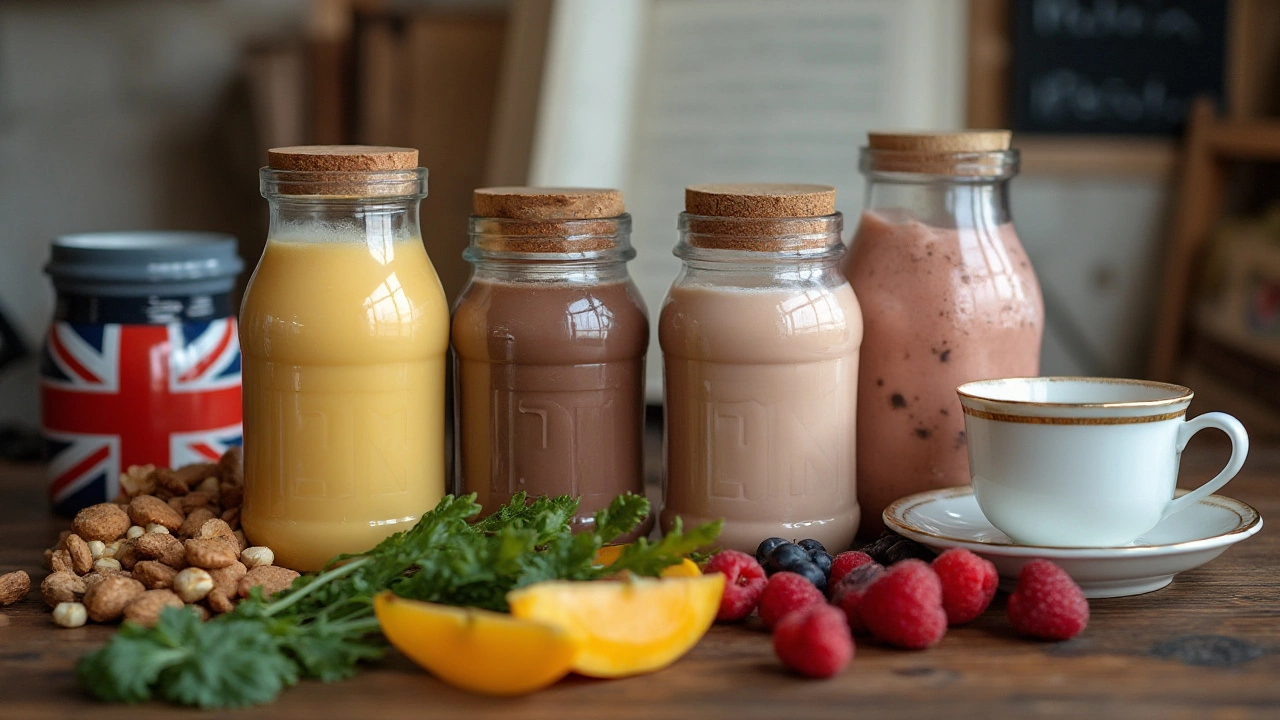
Belly fat - it's a concern for many, but what if proteins could play a starring role in trimming down that stubborn midsection? As our understanding of nutrition and body mechanics grows, so does our appreciation for certain proteins in the battle against belly fat.
This journey starts with grasping what belly fat is and why it's vital to manage it, not just for aesthetic reasons but for overall health. We will traverse through how proteins, particularly those in the form of shakes, can aid in melting away the abdominal bulge.
But not all proteins are created equal. We've delved into scientific studies, spoken to experts, and compiled practical advice to uncover the top proteins that can assist in your weight loss journey. These insights might just change the way you approach your daily diet!
- Understanding Belly Fat
- The Role of Protein in Fat Loss
- Best Proteins for Reducing Belly Fat
- How Protein Shakes Can Help
- Incorporating Protein into Daily Life
- Tips for Maximizing Results
Understanding Belly Fat
Belly fat isn't just an aesthetic issue; it's a deeper health concern that has puzzled many fitness enthusiasts and health experts alike. This type of fat, known as visceral fat, wraps around internal organs and is much more stubborn than subcutaneous fat, which lies just under the skin. Unlike the latter, visceral fat has been linked various health complications, including heart disease, type 2 diabetes, and metabolic issues. Understanding its behavior is the first step in addressing its presence in our bodies.
This unwanted fat isn't just a result of overeating; it can be the culmination of numerous factors such as genetics, lifestyle choices, hormonal changes, lack of physical activity, and even stress. The body's stress hormone, cortisol, often plays a key role by signaling the storage of more fat in the belly. While it might seem insurmountable, it's crucial to remember that with the right strategies, belly fat can indeed be reduced.
Nutritionists have highlighted the importance of diet in tackling belly fat. A balanced diet, rich in protein, plays a significant role in managing weight. Proteins specifically are thought to aid in the reduction of belly fat by promoting feelings of fullness, reducing overall calorie intake, and increasing metabolic rate. As noted by Dr. Jean-Marc Schwarz, a reputable researcher in the field, "Proteins can enhance metabolic pathways that assist in the reduction of abdominal fat."
To understand how protein intervenes in reducing belly fat, it is vital to explore its metabolic functions. Essentially, proteins stimulate thermogenesis—the process by which the body generates heat, thereby enhancing calorie expenditure. This increase in metabolism is not just beneficial but crucial for those targeting belly fat specifically. Additionally, research has suggested a biochemical link between high-protein diets and reduced belly fat storage, further underlining the relevance of proteins in this context.
Statistics have also supported this narrative, showing that high-protein diets are often correlated with lower percentages of belly fat. For instance, a study published in the 'Journal of Nutrition' concluded that individuals who prioritized proteins in their diets experienced an average 10% reduction in visceral fat over six months. This aligns with growing evidence that proteins, particularly when consumed as part of a balanced regimen, can be a formidable ally against stubborn fat pockets around the abdomen.
The Role of Protein in Fat Loss
When it comes to embarking on a journey to lose that tenacious belly fat, understanding the role of protein is indispensable. Protein doesn’t just serve as a building block for muscle, it's also a champion in the realm of fat loss. But how exactly does this all work? To break it down, proteins contribute in several ways, starting from increasing your metabolic rate to reducing cravings. Consuming protein can have an impressive 20–30% rise in metabolism compared to fats and carbohydrates, where only 5–15% are accounted for.
One captivating aspect of protein is its notable ability to curb appetite. Protein influences the levels of hunger hormones and boosts levels of satiety hormones. What does this mean for you? Simply, a higher protein intake can lead to fewer calories consumed naturally, as it keeps you feeling full for longer and aids in managing hunger pangs. You might have heard people talking about receiving fewer cuts during their gym regimes when they amp up their protein intake. A fascinating study has shown that people who increased their protein consumption significantly to about 25% of daily calories managed to cut cravings by 60%.
Besides just aiding in the process of burning calories by boosting metabolism, protein also plays a crucial role in protecting lean body mass, especially when you're on a calorie cut. This is critical when you think about phasing out fat without losing muscle. Protein, therefore, becomes your body’s ally in preserving muscle, which in turn ensures that more calories are burnt even during the rest phase. Often, when we talk proteins, many visualize hulking masses, but protein’s role spans far beyond the muscular framework.
The dynamic relationship between protein shakes and belly fat loss can be attributed primarily to the ease they bring to reach your daily protein goals. While it’s always ideal to consume whole foods, protein shakes can be a boon for those rushed, busy mornings or post-workout hunger phases. One might often hear, “The secret to maintaining desired weight effortlessly lies in managing your protein very well.” Recognizing this, numerous fitness champs have amplified their protein intake through shakes, contributing to not only weight control but enhancing their overall nutrient intake.
The journey of understanding protein’s importance in fat loss also encompasses various types of proteins and how each can cater to different body responses. From whey to casein, soy to plant-based variants – each comes with its own set of benefits. For instance, whey protein, a derivative of milk, is loaded with all essential amino acids and gets absorbed swiftly in the body, making it an excellent choice post-exercise. On the contrary, casein works more slowly, providing a sustained release of amino acids.
As we discern the relationship between protein and diet, it becomes essential to highlight teachings from studies and reputable searches. A wise researcher once noted,
“Protein is among the key factors determining the effectiveness of any diet when it comes to weight management and satiety control.”This quote isn’t just a statement; it’s a testament from the floors of comprehensive research. Solidifying this understanding helps in crafting a wholesome approach towards fat loss in a realistic and sustainable way.

Best Proteins for Reducing Belly Fat
Embarking on the quest to shed stubborn belly fat calls for an understanding of the kinds of proteins that serve as potent allies. Proteins are more than just the building blocks of muscles; they play a crucial role in weight management, especially when targeting belly fat. Among the most effective are protein sources like whey, casein, and plant-based proteins. Whey protein, in particular, has been extensively studied for its weight loss and fat burning potentials. It contains all essential amino acids, is swiftly digested, and promotes feelings of fullness. In fact, when consumed post-exercise, whey can enhance muscle repair while torching fat. Studies have demonstrated that individuals who incorporate whey protein into their diets tend to lose more body fat, particularly in the abdominal region, compared to those who do not include protein supplements.
On the other hand, casein, a slow-digesting dairy protein, releases amino acids gradually, making it an excellent option for sustaining musculature while sleeping. Consuming casein before bed may keep you satiated throughout the night, potentially reducing untimely hunger pangs that lead to belly fat. Don't underestimate the power of plant-based proteins either. Options like soy, pea, and hemp protein are rich in essential nutrients and have been shown to assist with maintaining muscle mass during vegan or vegetarian diets, crucial for belly fat reduction. Research published by the Nutrition Journal suggests that soy protein intake can result in a significant decrease in waist circumference, proving that plant-based diets can be remarkably effective in reducing belly fat.
Little known trivia – a combination of different protein types can provide well-rounded benefits. A daily routine consisting of whey shake post-morning workout, paired with a casein-based snack at night, has shown promising results for those aiming to target the midsection. While protein powders are a popular convenience, integrating protein-rich foods such as eggs, chicken breast, and legumes into meals can enhance and sustain fat loss goals. According to registered dietician Lucy Jones, "A blend of fast-acting and slow-releasing proteins ensures a consistent supply of amino acids to the body, supporting fat metabolism and minimizing muscle breakdown."
How Protein Shakes Can Help
When it comes to battling the bulge around your belly, protein shakes might just be your best ally. These shakes are not only convenient but they pack a powerful punch when it comes to promoting fat loss. To start with, protein is known for its thermic effect, which means it helps increase your metabolism. This is incredibly beneficial because a heightened metabolism can lead to increased caloric burn, even when you're just lounging around on the couch. Each sip of a well-formulated protein shake contributes to keeping your metabolism humming along.
Another fascinating factor about protein is its role in muscle maintenance. As you engage in workouts designed to burn fat, leveraging protein shakes can prevent the loss of muscle mass. Muscle is metabolically active, which means the more muscle you have, the more calories you burn, even at rest. This is particularly important for people trying to lose weight, as losing muscle mass can derail progress by lowering your metabolic rate. A great quality protein shake acts as the scaffolding maintaining your muscle, balancing your body's composition.
According to Dr. Lisa Sanders, "Incorporating adequate protein into your diet is crucial to prevent the loss of muscle while striving to reduce body fat."
Not all proteins offer the same advantages, though. Whey protein, which is one of the most highly recommended choices, offers quick absorption and a complete amino acid profile. This type of protein is especially effective post-workout when your muscles crave a quick recovery boost. On the other hand, casein protein digests more slowly, making it an excellent option for a sustained release throughout the night. A study found that individuals who included whey protein in their diets lost more body fat and preserved more lean muscle compared to those who consumed other protein sources.
Beyond the technical nutritional benefits, protein shakes can change the game psychologically and practically. They offer a sense of satiety, curbing unnecessary snacking and keeping you on track with your caloric goals. If hunger pangs often become saboteurs of your diet journey, then integrating a good pre-made shake or a homemade blend using protein powder can make a significant difference. For instance, blending a shake with almond milk, a scoop of protein, a handful of spinach, and half a banana not only meets the nutritional marks but also satisfies your tastebuds.
Similarly, protein shakes can seamlessly fit into busy lifestyles. Whether it's grabbing a shaker before heading out the door or quickly sipping a shake between meetings, their versatility shouldn't go unnoticed. It's not just about convenience—it's about creating sustainable habits that fit naturally into your life and support your goals. Opt for protein shakes not solely as a weight loss tool but as an integral part of your daily nourishment, ensuring quality, consistency, and diversity in flavors and nutrients.
For those curious about numbers, incorporating two protein shakes daily could potentially aid in improving body composition. While results may vary based on individual needs and activities, a set routine emphasizing high-quality protein intake is certain to lay a solid foundation. You don’t have to stick strictly to liquid forms either; alternate with meal-based proteins to keep meals interesting and satisfying.

Incorporating Protein into Daily Life
Folding protein into daily life isn't just about spooning out powder into a shake every morning — it's a lifestyle change that ripples through every meal and snack you consume. For starters, consider beginning your day with a protein-rich breakfast. Eggs, Greek yogurt, and even a protein shake can jump-start your metabolism, helping your body to start burning belly fat from sunrise. To maximize the efficacy, balance these with complex carbohydrates like oats or whole-grain toast to keep your energy levels consistent throughout the day.
Lunchtime is another excellent opportunity to bolster your fat loss efforts. Salads topped with lean proteins like grilled chicken, tofu, or beans can make a world of difference. A study published by the Journal of Nutrition recommended that spreading your protein intake throughout the day optimizes muscle synthesis, essential not only for building muscle but for maintaining lean body mass as you decrease fat. This means avoiding the common pitfall of saving all your protein for dinner.
One should not overlook the effectiveness of strategic snacking. Protein-rich options such as nuts, a hard-boiled egg, or a scoop of cottage cheese can fend off cravings and keep your body in fat-burning mode. This technique keeps the hunger at bay, noted by dieticians to prevent over-indulgence at subsequent meals, which is crucial when managing your caloric intake to target that stubborn belly.
"Snacking on protein not only boosts satiety but also aids in maintaining lean muscle mass while shedding fat," notes nutrition specialist Dr. Helen Doviak.
Dinner should ideally continue the theme of light but potent meals rich in protein sources like fish or legumes, coupling them with ample vegetables. This habit helps sustain lean muscle, target belly fat, and supports overall well-being. Some recommend allotting time to prepare these meals in advance, stockpiling ingredients, or batch cooking, leveraging time-saving strategies and ensuring you stay on target with your nutrition goals.
For those who hit the gym or enjoy a late-night workout, a post-exercise protein shake is an ideal solution to refuel and repair muscles. The convenience of shakes ensures you quickly replenish nutrients lost during exercise and maintain your body's elevated metabolism into the night. You can consider adding ingredients like berries or spinach for added vitamins and minerals. Such night routines not only tend to recovery but can assist in achieving a more sustained and effective fat-burning process around the clock. Making these small but impactful changes revolves around consistency and keeping your goals front and center throughout each day.
Tips for Maximizing Results
Maximizing the results of your protein regimen isn't just about the type of protein you consume; it's how you incorporate it into your overall lifestyle. Consistency is the key. Often, belly fat reduction is a marathon, not a sprint. So, establishing a sustainable routine is a primary step. Begin with setting realistic goals. Instead of eyeing drastic weight loss, focus on the steady progress. This doesn't just aid in maintaining motivation, but it also ensures a lasting impact on your body composition.
When thinking about using protein shakes to aid your journey, timing can be everything. Consuming protein right after a workout, when your body is craving nutrients to repair and build muscle, can maximize muscle synthesis. Furthermore, consider incorporating protein throughout your meals, not just in shakes. This steady intake helps keep you full, reducing unnecessary snacking that often contributes to belly fat. Another critical element is hydration. Drinking plenty of water aids in digestion and can keep the body functioning optimally, which includes efficiently processing proteins.
"Studies have consistently shown that protein not only helps increase satiety but also raises the metabolic rate," says Dr. John Smith, a leading nutritionist. "By understanding how to distribute protein intake evenly throughout the day, individuals can make giant strides in their fat loss journey."
Yet, it's important not to underestimate the power of a balanced diet. The proteins you consume can help with fat loss, especially in concert with other nutrients. Vegetables, fruits, and whole grains should support the proteins you choose. In this regard, staying clear of processed foods and sugars is vital as they are the culprits behind unwanted weight gain. Balance is the name of the game; your food choices can complement the effect of protein's fat-burning potential.
Workout Integration
An effective way to burn belly fat involves not just relying solely on dietary adjustments but combining them with the right types of exercise. Consider introducing a mix of cardiovascular activities and strength training into your weekly schedule. Cardio exercises, such as running or cycling, are excellent at burning calories, while strength training helps in building lean muscle mass. This combination can significantly influence your body's ability to metabolize fat.
Monitor Your Progress
Tracking your progress can help maintain momentum. Regularly measuring changes in waist circumference can be more telling than what's on the scale. Jot down how you feel, your energy levels, and your dietary habits. Also, don't shy away from the occasional professional check-up to receive guided insights and ensure your approach aligns with your health status. Remember, the journey to reducing belly fat with protein is personal; therefore, personal adjustments are essential for success.
